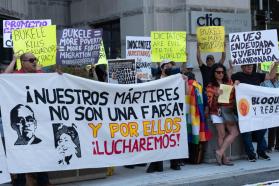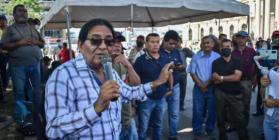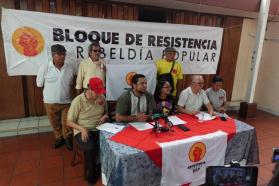30 years after Jesuit murder, El Salvador grapples with reconciliation and justice
On November 16, 1989, Salvadoran soldiers killed six Jesuit priests, their housekeeper and her daughter at the University of Central America. After nine years of war, the murders were a lightning rod for international pressure on President Alfredo Cristiani from the hard-right Nationalist Republican Alliance (ARENA) and on the United States to cease its military support. Thirty years later, El Salvador is in the midst of a critical national debate regarding a reconciliation law intended to redress grave human rights abuses committed during the armed conflict.
In 2016, after decades of advocacy by human rights organizations in El Salvador and internationally, as well as by the leftist Farabundo Martí National Liberation Front (FMLN) party, the Supreme Court’s Constitutional Chamber finally struck down the 1993 Amnesty Law, which provided “complete, absolute and unconditional” amnesty for all crimes committed during the war.
The Office of the UN High Commissioner for Human Rights celebrated this “historic decision for the country [that] gives hope to the victims.” Numerous high-profile cases have since been re-opened, including the assassination of Archbishop Romero, the massacre in El Mozote, and the murder of the Jesuits.
In its ruling, the Constitutional Chamber charged the Legislative Assembly with crafting a new law to address grave acts of violence and to guarantee justice for the victims. For nearly two years, there was little momentum in the Assembly. An Ad-Hoc Commission was formed in June 2018 but, unable to come to agreement and facing public scrutiny for the fact that four out of five members were direct actors in the armed conflict, including former military generals, the commission dissolved in May 2019 without proposing a bill.
Soon after, representatives of victims’ associations including Pro-Búsqueda and COMADRES presented a proposal, the “Special Law for Comprehensive Reparations and Access to Justice for Victims of Grave Human Rights Violations during the Armed Conflict,” to a new legislative subcommittee. The bill seeks to guarantee truth, justice and reparations to victims, including by ensuring public access to the currently-sealed files of the UN Truth Commission and upholding their validity in court.
But the next day, the subcommittee presented its own bill, the “Transitional and Restorative Justice Law for National Reconciliation.” While the law contains many provisions that supporters point to as being responsive to the victims’ demands, the legislators’ bill would have allowed perpetrators to avoid prison sentences “in exchange for collaborating in the clarification of the facts or accusing others of these crimes or locating the remains of the victims.” Additionally, the proposed law required the Attorney General to make “on a single occasion a list of cases to be investigated and judicially prosecuted” and would only be applicable for five years, with a possible one-time extension of two years.
In contrast, the proposal put forward by the victims would allow the Attorney General to reduce – but not eliminate – prison time for lower-level perpetrators of war crimes and crimes against humanity if they assisted in the identification of higher-ranking individuals involved. In addition, any victim would at any time be able to request the investigation of a crime and prosecution of its perpetrators.
Human rights defenders immediately denounced the legislators’ proposal. In the face of highly-effective political pressure and intense media coverage, the Legislative Assembly’s Political Commission abstained from voting on the bill and instead began a process of consultation with the Catholic Church, Armed Forces, victims’ associations, and Salvadoran civil society organizations.
According to Damián Alegría, the FMLN’s representative on the subcommittee, “The primary area of contention is around the issue of justice and for that reason, together with civil society organizations, churches, universities and everyone who will participate, [the consultation process] will help us to establish how to define this point so that in the end, we have a clearer position on it.” The FMLN parliamentary group carried out its own national consultation process at the community level, as well.
However, the subcommittee’s consultation process did more harm than good, according to David Morales, former Human Rights Ombudsman, who criticized the methodology, for example, “promoting the participation of ex-combatants of the war together with the victims of serious human rights violations, thereby generating re-victimization and confusion.”
Right-wing parties weren’t thrilled about the consultation process either, for reasons of their own. On October 14, the subcommittee members from ARENA, the PCN and the PDC voted to no longer accept opinions on the matter, to the outrage of victims and human rights defenders who, while critical of the manner in which it was being carried out, did not take issue with the consultation itself.
The Supreme Court had extended its deadline for the legislature to approve a new law until November 13. As the date approaches, FMLN legislator Damián Alegría predicts it “unlikely that we will have a law within the terms required by the [Supreme Court] sentence and that complies with the methodology that the victims have proposed.” If there is a proposed law, he said, “it will be one that does not meet all of the standards and only has the support and votes of the right-wing.”
Alegría explained that while the FMLN had previously tried to achieve some kind of agreement with the right-wing parties, “the scenario was complicated because [the right-wing parties] didn’t want comply with essential sections of the [Supreme Court] sentence.”
Moving forward, El Salvador’s human rights organizations will continue to press their demands for justice and reparations. Rafael Segura, member of the Association of Victim Survivors of the Armed Conflict, stated “[We] demand that the Legislative Assembly approve the proposal that we presented and that it soon become a bill.”
As the country prepares to commemorate the 30th anniversary of the massacre at the University of Central America, legislators have a historic opportunity to honor the demands of the victims, though it’s uncertain that they will. For a full timeline of events, see the original version of this article at www.cispes.org.

 "I am a CISPES supporter because continuing to fight for social justice and a more people-centered country means continuing the dream and sacrifice of thousands of my fellow Salvadorans who died for that vision.” - Padre Carlos, New York City
"I am a CISPES supporter because continuing to fight for social justice and a more people-centered country means continuing the dream and sacrifice of thousands of my fellow Salvadorans who died for that vision.” - Padre Carlos, New York City

